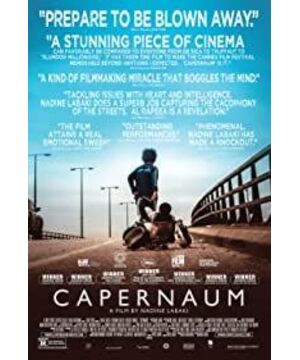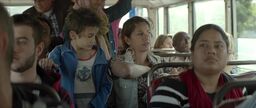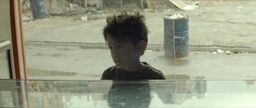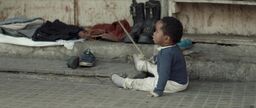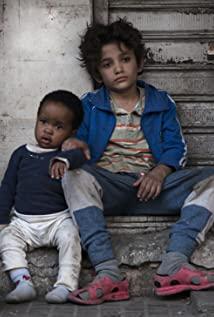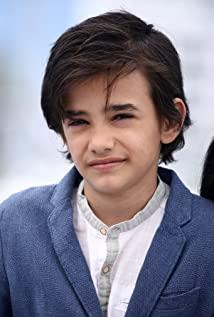What is home? Home to happiness, beauty and love!
I want to take you to fly everywhere, travel all over the world to watch, there are troubles and no sadness, and you are free and cheerful. . . . We are going to fly to that distant place to see that the world is not so bleak;
- "Zhang San's Song"
For Zane, this world is only desolate.
No adequate food, no clean water, no TV, no school...
It can be said that he does not have what a normal 12-year-old child should have, whether it is material or spiritual.
What does he have?
He has parents, and the kindest words that he said to him are "stinky boy, get out of the way"; he has four younger siblings, the youngest child is chained at home by his parents, and the eldest sister, after her first menstrual period, He is about to be sold by his parents to a grocery store owner as a wife; he has a job and carries heavy goods for the grocery store every day. The wheelbarrow is taller than him, and the meager income earned helps his parents maintain the family's survival... …
"Happy families are alike, but unhappy families are different." The opening sentence of Tolstoy's masterpiece "Anna Karenina", in fact, is more reasonable to say the other way around: happy Families have their own happiness, but unfortunate families are always alike, that is poverty!
Because of poverty, it is necessary to have more children. After a child is born, it is thrown on the ground to crawl for a few years, and after a few years of crying, it grows up. Older children can take care of small children, and small children can take care of younger children; boys can earn money to support their families when they grow up, and girls can "marry" when they are 11 or 12 years old to exchange some property.
Their family huddled together on a bed, and parents used a curtain to separate themselves from their children at night; not enough blankets to cover, the room was cluttered, with water upstairs, leaking downstairs, flies flying everywhere; often hungry, small of children can only survive on sugar water.
Zane accused his parents of giving birth to children without the ability to give them a real home. When judges and lawyers questioned why their eleven-year-old daughter Saha was "married", it indirectly led to her death. Zane's mother cried:
"It's so she doesn't suffer, she has no hope with us, she has almost no place to sleep, barely eats, doesn't take a bath, and can't watch TV. I told myself, marry her, at least she'll have one. A bed, a real bed, and blankets."
"Think about it, there is nothing at home, the children can only drink sugar water. If murder and arson could make the children live, I would have done it a long time ago. They are all my children. It is not my turn to blame me. Fallen meat."
How can a mother not feel sorry for her child? All this seems to be helpless, but is it really helpless? They can't have so many children. Behind the seemingly helpless, there is still the idea of actively voluntarily giving birth to more children. Zane's father said, "The child is the backbone of the parent. The child can help the parent with the work. And, what if that child has a future?!
The children of the poor are in charge of the family early, and because of poverty, Zane is extraordinarily "sensible". In addition to delivering to the grocery store, Zane has to deliver gas canisters and make vegetable and fruit juices to sell on the street. The burden of life has weighed down the young body and mind exhausted.
In the movie, Zane is not an exception, there are too many children like him.
Movies often show a long shot. Nearby slums are crowded with low and dilapidated houses next to each other, garbage and sewage are everywhere, and children with dirty clothes walk through, slapstick, and play. In the distance are forest-like high-rise buildings, flashing neon signs of the lives of other people in this world.
Without comparison, one cannot know the depth of sadness. All things are inherently uneven, and unevenness and polymorphism is the normal state of the world. The normal flow of high and low, noble and low is a sign of social health, and it is also a source of power for society to thrive. The poor become rich through years of hard work, and the rich become "nobles" through the accumulation of generations.
But there has never been such an exaggerated contrast between riches and poverty, as well as such stark lacerations, as in today's era. No matter how hard the poor work, they will still be poor; no matter how much the rich idle, they will not be poor.
Poverty means not only material deprivation, but also rigidity of thought, dwarfing of spirit and numbness of consciousness - this is the cruelty and horror of poverty in this world today.
The children of the poor have to enter the society early. Before they can obtain a hard armor from the family, they use their soft skin to resist the cold wind and rain outside. Before they have developed hard bones and strong muscles, they have to compete for survival. Fight in the torrent. It has to be said to be cruel and unfortunate.
Zane, who left home, came to a playground, got on a Ferris wheel, and slowly rose from low to high. The lights were bright in the distance. When he returned to the place, the reality was desolate. He also climbed onto the giant female sculpture in the playground and stripped the sculpture's breasts from the jacket. The playground symbolizes happiness, the Ferris wheel symbolizes beauty, and the breasts symbolize the desire for love (especially maternal love).
Happiness, beauty and love, the lack of these things is his spiritual poverty, and it is more difficult to make up for the lack of material and makes him more sad. During the day, Zane struggles to survive, and at night falls asleep with his lonely self. Therefore, when he saw Rachel breastfeeding and frolic, he turned his back and let the tears slip quietly.
We can condemn poverty, but who is qualified to condemn the poor? In the discourse system constructed by the "rich", efforts are made to change destiny and strive to achieve life. The reasons for poverty are ignorance, laziness and lack of progress. But is this really the case? Who caused the poverty of the poor?
At the beginning of the film, children in the slums play a game of fight and kill, armed with various homemade weapons. They imitated the armed shapes of various types of militants in the Middle East that we are so familiar with, reflecting the ongoing turmoil in the Middle East, and subtly planting an ugly culture of violence in the hearts of children, and it is this kind of It seems that the violent culture of violence is the ultimate source of their destiny.
In the film, we see a row of helicopters flying through the sky with a loud roar as Zane wanders the streets, but Zane turns a blind eye to it. This scene reflects the reality of the situation in the Middle East that Zane is in, that is, beside him, the specter of military conflict has been circling, these steel killers swishing through the sky with majesty, but they cannot be redeemed Difficulty, unable to save the human tragedy.
Zane met a little girl on the street. She fled here from Syria, and the turmoil in Syria has formed a large number of refugees and flooded into Lebanon, making Lebanon's economy even worse. The little girl's ultimate dream is to go to Switzerland, and the ins and outs of a refugee focused on her is precisely a major flow of refugees in the Middle East, that is, from Syria to Switzerland. Another black single mother, Raheel, is from Ethiopia in Africa, and she is also an important part of the refugee flow in the Middle East.
"Why Home" puts the poverty and chaos in Zane's country in the sand table of the entire Middle East, and thus finds the deep background of the suffering and survival on the front of the movie. It wasn't that they caused poverty and chaos, they had to endure it and there was nothing they could do.
In our discourse system, the tolerance of the rich is beyond imagination, and the harshness of the poor is beyond imagination. Be wary of all praise of poverty, for the one who utters it must not be poor.
Only those who have experienced poverty firsthand know that the poor have only disgust and anger towards poverty.
The greatest harm of poverty is the loss of dignity, and enduring insults and damages has become the norm of life.
Zane steals for a living, steals some food or daily necessities from the store; cheats, cheats some prescription drugs from the doctor from the pharmacy, sells the sea water as a drink to passers-by; lies, tells others false names and experiences; "robbery", put Another kid's scooter in the ghetto grabbed to make a cart; fierce, raised his thin fist at the gangsters, and said viciously let them be careful...
But the bad behaviors and qualities of stealing, cheating, lying, "robbery", ferocity, etc. are not just for yourself, but for the choices others have to make.
Zane, there are a thousand reasons to fall and let himself go, but he still chooses love and commitment. Even if his dignity was damaged and life was only miserable for him, he still chose to stick to kindness: he did his best to protect his sister at home, since he was entrusted by Rachel, a black maid, to take care of her son. After the ID card was captured, he tried his best to keep the little boy from starving while looking for Rachel. In movies, we can often see the kindness of human nature, and there are always good-hearted people who are willing to lend a helping hand.
Zane endured hunger, humiliation, grief, pain, anger—all the desolation the world had put on him. He even dreamed of smuggling to Denmark to say goodbye to misery.
When he got home and learned from his father that he didn't even have an ID card, he was desperate. What made him even more desperate was that his sister, who had been married for three months, had died, and the eleven-year-old Saha died of hemorrhage due to pregnancy. He picked up the knife, rushed out of the house, found the grocery store owner Sahad, and stabbed the knife with force, also stabbing the invisible miserable fate.
After watching the movie, someone commented, "It was only after watching the movie that I realized how lucky I am to live in China."
The only people who can feel lucky and complacent from the suffering of others are Ah Q-style Chinese!
This movie has taught us that there are still so many people in this world who live in misery beyond what we see in the media, beyond the aperture of the camera.
And a better world requires everyone to use their own conscience to think and discern, to face reality, to expose suffering, to speak out, and to act. It is impossible for everyone to live in countries like Switzerland and Denmark, but through everyone's efforts and appeals, we can make our country a livable place little by little.
For parents, it is not something to be proud of just giving life to children. Real pride comes from the awakening and responsibility of parents, giving children basic material security, and more importantly, giving children what a real home must have. Stuff - there is joy, beauty and love.
What is home? Where is your home?
The place of birth is not home, but the place where there is joy, beauty and love.
Finally, I want to say: it is not the movie that shocks people, but the reality!
The actor who played the little boy in "What's Home" changed his fate because of this film, and his family moved to Norway. But there are still too many children like him, still living in the chaos and poverty brought about by the war.
At the end of the movie, Zane finally smiled, but after watching the movie, it was difficult for us to walk out of the cinema with a smile.
View more about Capernaum reviews


